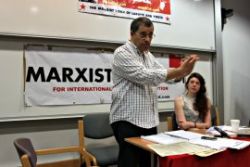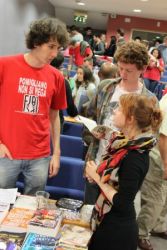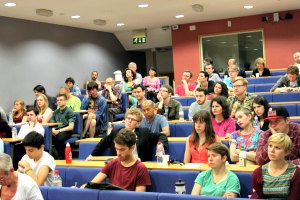Over 100 comrades attended the 4th annual Marxist Summer School in London, hosted by the IMT and UCLU Marxist Society from 20th-22nd June. The theme of this year’s school was ‘A Century of Struggle’ to commemorate not only capitalism’s passing over into imperialist barbarism in World War One, but also the manifold revolutions led by the working class in a period where capitalism has ceased to play any remotely progressive role.
30 years since the miners’ strike
The school kicked off on Friday night with a session on the Great Miners’ Strike, which began 30 years ago. Two ex-miners who were active participants in the struggle, John Dunn and Chris Herriot, addressed the opening session with the same passion, humour and anger with which the miners fought this heroic struggle 30 years ago.
John recalled the events of Orgreave, where thousands of striking miners faced the full force of the capitalist state, with many picketers finding themselves on the receiving end of an onslaught of police brutality. John explained how the media played a despicable role in demonising the miners - particularly so the BBC, who famously reversed the footage of the “Battle of Orgreave”, making it seem that the miners had first attacked the police, when it fact the opposite was true.
Chris then linked the struggle of the miners to the struggle facing the labour movement today, outlining how the defeat of the miners’ strike was ultimately due to its failure to put forward political demands that could link the struggle of the miners to the general fight in the labour movement for a socialist programme. This lesson is more valuable today than ever, at a time when another Tory-led government is inflicting austerity on workers and youth for the sake of maintaining this rotten and senile capitalist system.
Following this opening session, a social was held by comrades of the UCLU Marxist society, giving attendees the opportunity to discuss more over a drink or two.
Before Saturday morning’s political discussions started with a packed plenary session on the national question, about 10 comrades visited the picket line at Euston Fire Station to show their solidarity with an all-day FBU strike. The firefighters were out in force, and the visit of the comrades visibly lifted them, not least because we gave them food bought with money from a collection at the social the previous evening.
It was also valuable for young comrades to hear the experiences of striking workers out on the front line. FBU General Secretary Matt Wrack was there to support his members, and his speech emphasised the necessity of the strike and the strength of a co-ordinated working class. Most importantly, the visit served to strengthen the burgeoning ties between the Marxist Student Federation and the labour movement, which will only continue to grow as working people and students alike are further radicalised by events.
The national question
 Fred Weston speakingThe session on the national question was chosen because nationalism of various kinds has been an enduring aspect of revolutions and counter-revolutions over the past hundred years, and has recently revealed itself both in Scotland and Ukraine. Mesoul from the Edinburgh Marxists reports from this session:
Fred Weston speakingThe session on the national question was chosen because nationalism of various kinds has been an enduring aspect of revolutions and counter-revolutions over the past hundred years, and has recently revealed itself both in Scotland and Ukraine. Mesoul from the Edinburgh Marxists reports from this session:
“The school continued with a session on the national question led by Fred Weston. This is an important part of Marxist struggle, as Lenin said, "without understanding the national question, the success of revolution will be at risk".
“The world politics and international relations that we are witnessing today, especially events such as wars and national struggles for self determination, are the result of the capitalistic nature of the creation of nation states. The birth of the nation state was the expression of the development of capitalism which requires new and bigger markets. Furthermore, the imperialists drew straight lines with rulers and pencils to artificially create many former colonial countries around the world that we see today; and these imperialists didn't take into account the complex array of cultures, languages, religions, and ethnicities. This facilitated the imperialists policy of divide and rule, and is why we can see many countries such as Iraq falling into sectarian war today.
“As might be expected by some people at the international Marxist school, the referendum on Scottish independence did come up. As Fred Weston put it, Marxists respect the right to self determination, but there are things that need to be explained beyond the self-determination and separation itself. A revolutionary organisation needs to put the firm point of argument that there is no solution under capitalism, the system which is the source of all inequalities that are haunting the world today. As mentioned by a comrade from Scotland, the growing inclination towards a YES vote is the expression of the failure of Labour leaders in putting forward the socialist program. The absence of an alternative to Tory policies from Labour has resulted in resentment among the working people which has temporarily been expressed in a nationalistic fashion.”
Capital and May ‘68
After lunch there were two parallel sessions on ‘Why Study Marx’s Capital’ by Rob Sewell and ‘The French Revolution of May ‘68’ by Jerome Metellus of the IMT’s French section, who have just launched a new paper Revolution.
Rob discussed the importance and relevance of Marx’s Capital, which is being raised again in the media following the release of Thomas Piketty’s tome “Capital in the 21st Century”. Rob explained the limitations of Piketty’s method and conclusions, and instead put forward the Marxist method and analysis for the workings of capitalism, explaining the breakthroughs that Marx made in the field of political economy. With Marx’s revolutionary method, one can see why capitalism goes into crisis, and why the only genuine solution is for the socialist transformation of society, to establish a democratic and rational plan of production.
Wendy from the Sussex Marxist participated in the session on May ‘68, and she here reports the points that were discussed:
“It was not trendy to expect a working class revolution in a society experiencing a booming economy and growing living standards in the 1960s. And yet the unexpected occurred. Two out of three workers (10 million) went on strike - the biggest in history - in a mass movement kicked off by the students. Such was the movement’s power that the workers became conscious of the fact that they are the driving force, and therefore had the power, over France’s booming economy. Power was in the hands of people, the people that were the only ones contributing to the development of society through their labour.
“But of course it was something that other capitalist countries like Britain did not want to acknowledge as they were fearful that the same thing would occur. This is partly the reason as to why there was a lack of media coverage and neglect by academics, because they knew of the domino effect it could have had in different countries. But in the 21st century the inevitable is happening again, with the rise of the masses in countries all over the world demanding change, such as in Spain, Portugal, Italy, Greece, Egypt, Tunisia and the Arab nations. Without a doubt the revolution of May 1968 did show that in fact real power resided in the hands of workers. But a mass demonstration and general strike only raises the question of power, it does not solve it, and it was the political weakness of the leadership of the workers that meant that this question of power was not resolved in favour of the working class.”
1914-2014: imperialism then and now
After these parallel sessions we reconvened for another plenary, which was to be the largest meeting of the weekend, with Alan Woods speaking on World War I and Imperialism Today. Scott Leonard from Sheffield Marxists reports from this session;
“On Saturday evening, a very interesting discussion was led by Alan Woods on the relevance of imperialism today on the 100th anniversary of the start of the First World War. Alan started by discussing the causes of the start of the War and why this was due to the imperialist nations and their wishes for further colonial expansion, rather than the “Little Belgium” excuse used by the British for their involvement. Indeed it was pointed out by several comrades that the “Little Belgium” reason given by Britain was far from the truth, as Belgium’s colonisation of Congo was perhaps the most shocking exploitation of a colony by any of the imperialist nations. Alan also pointed out the increased class radicalisation, not only after the First World War, but also the Second World War, which shows how these imperialist wars increased anger among the working class.
“During the discussion from the floor, many interesting points were made. It was pointed out by a comrade that the present day crisis in Ukraine is an example of modern day European Union imperialism in supporting the group most likely to offer better ‘markets’ for the European capitalists. A further example was raised by an Egyptian comrade about the recent revolutions in her country and again the reactions of imperialist nations in referring to the removal of President Morsi as a coup.
“In his summing up, Alan also discussed the point that we commemorate the deaths of these millions of men every year, who died in a war that was only of benefit to the bourgeoisie. The ‘celebrations’ of victory seem to always forget about these millions of working class people who lost their lives.”
After a tiring day comrades then retired to a social with drinks and snacks provided by the SOAS Marxist society.
The struggle against fascism in the Ukraine
Sunday morning began with a meeting on the newly founded ‘Solidarity with the Antifascist Resistance in Ukraine’ campaign, which was a plenary session. Jorge Martin gave an extremely thorough leadoff in which he outlined the history of the current crisis in Ukraine, the extent of US and EU imperialist meddling in the country, and the harsh austerity and privatisation measures being imposed onto the country thereby.
Jorge explained the nature of the anti-Kiev rebellion in the East of the country, which is not a Moscow puppet, and which has a strong working class involvement in it, reflected in the class based demands it has put forward against the oligarchy. This movement has quickly become one of self-defence against the far-right and fascist elements being used as an auxiliary by the reactionary Kiev regime, and it is mainly for that reason that the campaign in solidarity with them has been launched.
Much of the discussion focused around the nature of this campaign, with Jorge and others arguing that we, as Marxists, must understand that the real culprit in this crisis is not West Ukraine, or even the EU, but is capitalism; thus the solution to the crisis is to unite the entire Ukrainian working class on a socialist programme which can also appeal to Russian workers and workers in the EU.
Feminism and Bolshevism
The final two sessions, running in parallel, were Ben Peck’s talk on ‘The Origins of Bolshevism’ and Ylva Vinberg of the IMT’s Swedish section Avanti , who spoke on Marxism and Feminism.
 Ben’s introduction outlined the historical development of Russian Marxism, from its early origins as Marxist discussion groups, through a more agitational turn and expansion, and the eventual formation of the Bolsheviks - first as a separate tendency and later as a separate party. In particular, Ben highlighted the important role played by Lenin, who insisted on maintaining a clear Marxist programme at all times, and the revolutionary paper Iskra that Lenin founded and edited. The history of the Bolsheviks provides countless valuable lessons for those attempting to the fight for Marxist ideas in Britain and internationally today.
Ben’s introduction outlined the historical development of Russian Marxism, from its early origins as Marxist discussion groups, through a more agitational turn and expansion, and the eventual formation of the Bolsheviks - first as a separate tendency and later as a separate party. In particular, Ben highlighted the important role played by Lenin, who insisted on maintaining a clear Marxist programme at all times, and the revolutionary paper Iskra that Lenin founded and edited. The history of the Bolsheviks provides countless valuable lessons for those attempting to the fight for Marxist ideas in Britain and internationally today.
Ellie Swan reports on the session on Marxism and Feminism:
“I really enjoyed Ylva’s talk on Marxism and Feminism. Ylva demonstrated how women’s oppression, like all oppression, is the result of class society. Class oppression takes different forms – for example women are used as cheaper labour, and are objectified and commodified in order to advertise beauty products and raise the next generation of workers for the capitalists to exploit. To end this oppression, women and all other oppressed groups, must not allow workers to be divided by capitalism, but must unite to abolish this system that divides and exploits all workers.
“As a woman I have experienced a lot of sexism in my life, but I can see that society won’t change just by creating new laws under capitalism. Even though socialism won’t immediately change social oppression of women – although socialist economic legislation would certainly improve our lot – removing the system that strives to divide workers and obstruct class unity lays the basis for a society without oppression of any kind.”
The need for revolutionary leadership
The school was closed on Sunday afternoon with remarks from Alan Woods, who referred to the fact that despite there being so many great revolutionary struggles of the working class since WWI, in only one of those events did the working class come to power - in 1917 in Russia. It is no coincidence that that revolution was distinguished by having a large and dedicated revolutionary proletarian party that had been built and prepared in advance.
That is the lesson of the last century and of all the failed revolutions since 1917 - not the lack of workers’ revolutions, but the lack of revolutionary leadership in the working class. Thus we must go forward and build the IMT into a worldwide organisation of revolutionary proletarian parties, so that the 21st Century completes the task begun with the Russian Revolution in the 20th.

